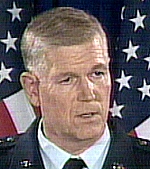-
(单词翻译:双击或拖选)
Washington
06 April 2007
Growing opposition1 in Congress to the war in Iraq is raising hard questions about whether the president's plan to send nearly 30,000 additional troops to Baghdad is too little, too late. But a former chairman of the U.S. Joint2 Chiefs of Staff says the troop surge will require more time and patience from the American public to make sure it works. VOA's Mil Arcega reports.
 |
| General Richard Myers |
General Richard Myers, Retired3 Joint Chiefs Chairman provides an encouraging numbers on the escalation4 of violence.
"There's been a 30 to 40 percent reduction in violence in the way that we measure it. That's pretty encouraging," he says.
General Richard Myers, a retired former chairman of the Joint Chiefs of Staff, is cautious about drawing any conclusions, but he says preliminary figures suggest the U.S. troop surge is already achieving the desired effect.
"And for the first time, as I understand it, Iraqis are now paying for more of their armed forces training and equipment than the U.S. is for the first time this year, so there are signs here that things are on the right track," he says.
With about half of the additional troops requested by President Bush now in place, reports show sectarian killings5 are down but suicide bombings are up. Jason Campbell is a military analyst6 at the Brookings Institution in Washington.
"Initially7 what we saw in the first three weeks of the surge was a sharp decrease in the amount of unidentified bodies found in Baghdad that showed signs of being either tortured or executed," he explains. "That number went to about 125 in the first three weeks. However, in the second three weeks of the surge, ending at the end of March, we saw that number almost double to 230."
Campbell says although the increased security has had a positive effect in parts of Baghdad, the larger military presence appears to have pushed the violence into other areas such as Baquba, where attacks have risen as much as 30 percent.
"What we're seeing now is that the violent attacks are spreading beyond Baghdad into areas that up until the last few months were not necessarily known for being areas of violence," Campbell says.
General Myers says the plan needs more time. He adds that the $120 billion supplemental funding bill approved by Congress, which sets a timetable for a U.S. pullout, would have dire8 consequences for Iraq's fledgling government.
"Not easy, the government's a year old," he notes. "Parliament in the end has acted in the best interests of the country. It's not been a pretty sight, but they're making progress. I hate to see that end too early. At the same time, as the president said, patience in this country wears thin."
The full complement9 of U.S. troops in Iraq will not be fully10 deployed11 until early June. President Bush says he will veto any funding bill that sets a timetable for troop withdrawal12.
 收听单词发音
收听单词发音
1
opposition

|
|
| n.反对,敌对 | |
参考例句: |
|
|
|
2
joint

|
|
| adj.联合的,共同的;n.关节,接合处;v.连接,贴合 | |
参考例句: |
|
|
|
3
retired

|
|
| adj.隐退的,退休的,退役的 | |
参考例句: |
|
|
|
4
escalation

|
|
| n.扩大,增加 | |
参考例句: |
|
|
|
5
killings

|
|
| 谋杀( killing的名词复数 ); 突然发大财,暴发 | |
参考例句: |
|
|
|
6
analyst

|
|
| n.分析家,化验员;心理分析学家 | |
参考例句: |
|
|
|
7
initially

|
|
| adv.最初,开始 | |
参考例句: |
|
|
|
8
dire

|
|
| adj.可怕的,悲惨的,阴惨的,极端的 | |
参考例句: |
|
|
|
9
complement

|
|
| n.补足物,船上的定员;补语;vt.补充,补足 | |
参考例句: |
|
|
|
10
fully

|
|
| adv.完全地,全部地,彻底地;充分地 | |
参考例句: |
|
|
|
11
deployed

|
|
| (尤指军事行动)使展开( deploy的过去式和过去分词 ); 施展; 部署; 有效地利用 | |
参考例句: |
|
|
|
12
withdrawal

|
|
| n.取回,提款;撤退,撤军;收回,撤销 | |
参考例句: |
|
|
|















